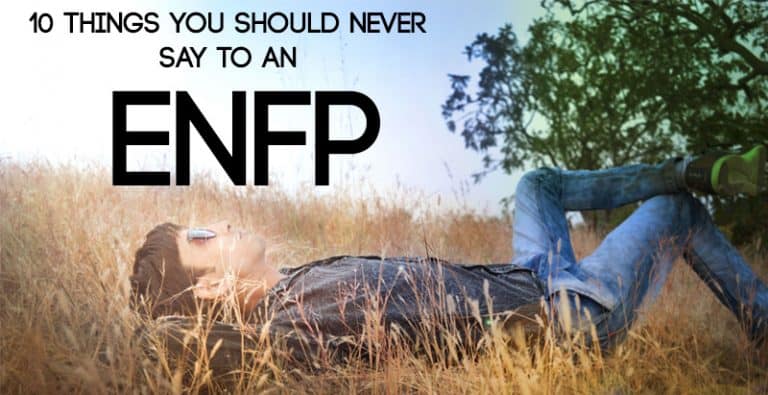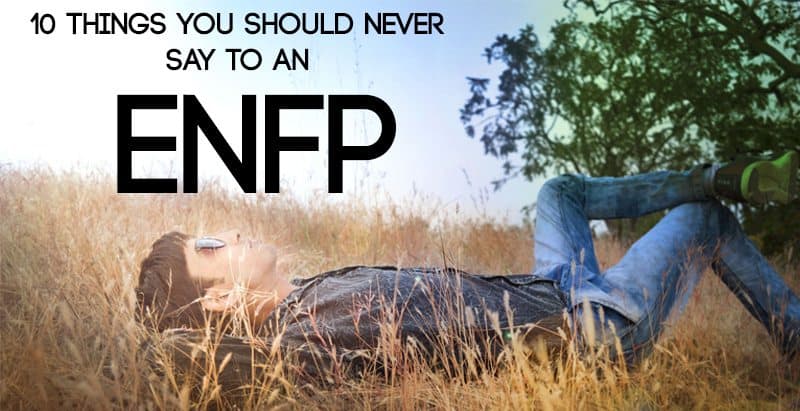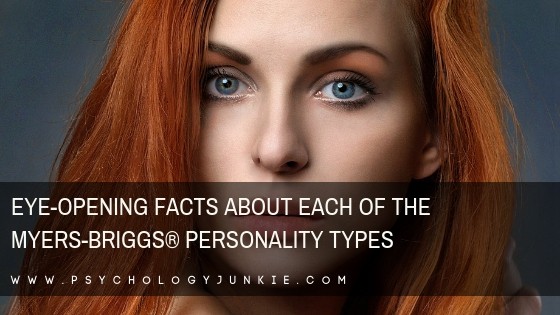10 Things You Should Never Say to an INFP
INFPs are known for being patient, passionate, and caring individuals. If you open many typology books you’ll read about how they are accepting, open-minded and sincere. Even so, there are certain phrases that really get on their nerves. They may not over-react or call someone out when careless words are spoken, but they will gradually put up guards against people who are condescending, cruel, or belittling. According to neuroscience, INFPs show high activity in brain regions that process verbal expression and language to find specific words fitting a situation. They don’t just spew out the first thoughts that come to their mind; they are careful and conscientious. Because they are so careful with how they speak, it can be frustrating for them to live in a world where few other people consider their words as carefully. So without further ado, here are some phrases you should never say to an INFP.
This post contains affiliate links. I only recommend products I truly believe in.

Not sure what your personality type is? Take our new personality questionnaire here. Or you can take the official MBTI® here.
10 Things You Should Never Say to an INFP
-
“You’re Being Too Emotional”
INFPs lead with a process called Introverted Feeling (Fi). Fi is deeply emotional, but it’s also deeply private (hence it’s introverted direction). INFPs are strongly affected by troubles in the world, by cruelty, bullying, or harsh words. They may seem more emotionally impacted than other types; however, because they prefer to keep their emotions more private they also feel frustrated when their reactions show. Saying they’re feeling something “too strongly” is a sure way to frustrate them and build walls in your communication. If they’re being emotional because they are stirred by something and they are trying to make a point, trying to downplay their values or their passion will only wreak havoc on your relationship with them. If they are speaking up about something that moves them emotionally it’s time to listen; condescension will get you nowhere.
-
“You’re Too Naive”
Healthy, balanced INFPs have a moral integrity that is hard to corrupt or change. They believe in being true to their values and standing up for their beliefs and ideals. They have no desire to gossip or make jokes at other people’s expense and they are deeply affected by cruelty and corruption in the world. Certain people misinterpret their idealism as weakness or naivety, when it is anything but. INFPs are often more than aware of the harsh realities of the world. But they choose to hope for something better for themselves and for the future. Trying to change them or to “educate” them on the ways of the world will just seem condescending.
-
“Don’t Take This Personally”
Prefacing an insult or critique by saying “don’t take this personally” will only make INFPs feel belittled and irritated. INFPs are more than happy to get constructive criticism, but it needs to be done in a way that isn’t patronizing. Zen habits has an amazing article on how to give constructive criticism kindly.
-
“Life’s Not Fair”
They already know this. Pointing this out really doesn’t help. To be honest, does anyone actually like hearing this?
-
“Stop Trying to Find a Deeper Meaning”
INFPs are programmed to find deeper meanings. They look for symbolism, patterns, and connections between ideas that build to a holistic understanding of the universe. They truly enjoy finding deeper significance behind real-life scenarios, music, movies, and storylines. Taking the depth, the mystery, and the gravity away from things is unnatural to them.
-
“Get Your Head Out of the Clouds”
INFPs are known for their vivid imaginations and their longing to explore new theoretical ideas and avenues of thought. They have a childlike wonder about the world and about possibilities in it. Some people feel it’s their duty to “bring them down to earth” and force them to confront the concrete realities of daily life. This kind of patronizing tone completely ignores the imaginative and creative gifts that INFPs bring to life.
-
“You Wouldn’t Understand”
INFPs yearn to understand and to “get in the shoes” of other people. Don’t dismiss their concerns or input without giving them a chance to at least try to understand. They are exceptional listeners.
-
“Because I Said So”
Adhering to a rule or demand just because an authority figure “says so” isn’t natural for an INFP. They need reasons, especially if their conscience conflicts with the directions given. Because INFPs have a strongly value-focused function (introverted feeling) and because they think outside the box (via extraverted intuition) they’re likely to question and confront ideas that seem rigid, don’t feel right, or don’t align with what they believe in.
-
“You’re Just Like This Other Person…”
INFPs are very individualistic people. They believe that everyone has a unique personality and that people shouldn’t be compared or held up to a pre-ordained set of standards. They try not to compare people and they dislike it when people compare them.
-
“Lighten Up!”
INFPs are extremely passionate, idealistic individuals and they believe in making a difference in the world around them. They often have a cause or belief they fight for and they are intensely focused on this cause. They have a hard time enjoying superficial pleasures or ignoring the pains of others. “Lightening up” can feel empty to them. They want to just be allowed to be who they are; whether that’s serious, playful, imaginative, solemn, sad, or exuberant!
The INFP and Stress
What Do You Think?
Do these phrases bother you? Do you have any other ideas of what not to say? Let me know in the comments!
Find out more about your personality type in our eBooks, Discovering You: Unlocking the Power of Personality Type, The INFJ – Understanding the Mystic, and The INFP – Understanding the Dreamer. You can also connect with me via Facebook, Instagram, or Twitter!
Other Articles You Might Enjoy!
10 Surprising Truths About INFPs
Why INFPs and INFJs Are Drawn to Sad Things
Subscribe to Our Newsletter

Want to discover more about personality type? Get the inside scoop with Susan Storm on all things typological, along with special subscriber freebies, and discounts on new eBooks and courses! Join our newsletter today!














Everything this kind soul had addressed is really true to me. Especially when someone says, “stop overthinking” I kind of get depressed because I take it as, “stop thinking”. Recently, while preparing for my examinations (which I feel unmotivated for) my teacher told me that, and I felt like crying. Also, just wondering, when you’re stressed, do you guys feel like you’re an INFJ? I took a test when I was stressed and the result was INFJ.
My pet peeves when someone:
(i) calls me “Dear” even when we are just mere acquaintances or even stranger eg. salesperson
(ii) tells me i “think too much”
(iii) says I’m being “too sensitive”
(iv) use the word “you” when making negative examples/statements when they are not even refering to me
(v) tells me to “grow up”
I got mad just reading this! All of these things are so true- if you were to tell me any of these things it would take me a long time to get over it. (INFP)
“ . They believe that everyone has a unique personality and that people shouldn’t be compared or held up to a pre-ordained set of standards.”
Are there people who don’t think this? Have they ever met their personality double?
I don’t like being called a pet name by store clerks and other casual acquaintances — and nor do I do that to others. Seems so condescending! I used to work with someone in the service industry who always got the best survey scores, no matter how impatient and annoyed she became with customers, because she always ended the transaction with, “all right, Darling. You have a great day!” Meanwhile her genuinely nice, but less saccharine, co-worker got terrible scores. (shrug.) We all used to sorta chuckle about it, but it still baffles me. I didn’t work there long enough to start getting scored by surveys. I can only imagine how I would have fared!
“Lighten up” irritates me the most. I just want to say, maybe you should stop being so frivolous and get real.
i hate it when people tell me I am being “pessimistic” when I just think out loud exploring what could possibly happen and how I would handle that situation. It doesn’t always mean I truely believe it’s going to happen, I just mentally prepare for as many situations as possible.
Or when I am being sad that they want me to act happy all the time, even though embracing sadness is just my way of coping. And I actually enjoy melancholy.
One last thing to add: I can hang in there for years with incompatible people: long after most would have had the good sense to walk away already. However, if someone tells me to grow up, I know right away that they aren’t someone I can take seriously. It’s over right then and there if I can help it. I will still be nice, unless something really heinous has happened.
I actually don’t get too bothered by conparison to other prople, usually. I find it’s a nice way to empathize and get to know the intricacies in others around me with a more relatable. This may of course be the writer in me, because I am constantly seeking similarities to compare and contrast with the characters I create and the people I know. Perhaps that is the difference? Discussing the contrast in addition to the likenesses.
Everything else on this list absolutely got my blood boiling. I’m especially glad that the “too emotional” one was #1 as that is absolutely my biggest pet peeve. We are humans. Emotions are inherent function of humanity. So annoying.
Same, I don’t mind being compared because I can see something new in myself I didn’t realize
I hate the “you wouldn’t understand” I get told this way too often
These are very accurate for me but I have to elaborate on point #4, “Life’s Not Fair.” To be more specific, it’s the phrase “Who says life is fair” that infuriates me because it is generally said as a reprimand, as though it’s a crime to care about life’s injustices.